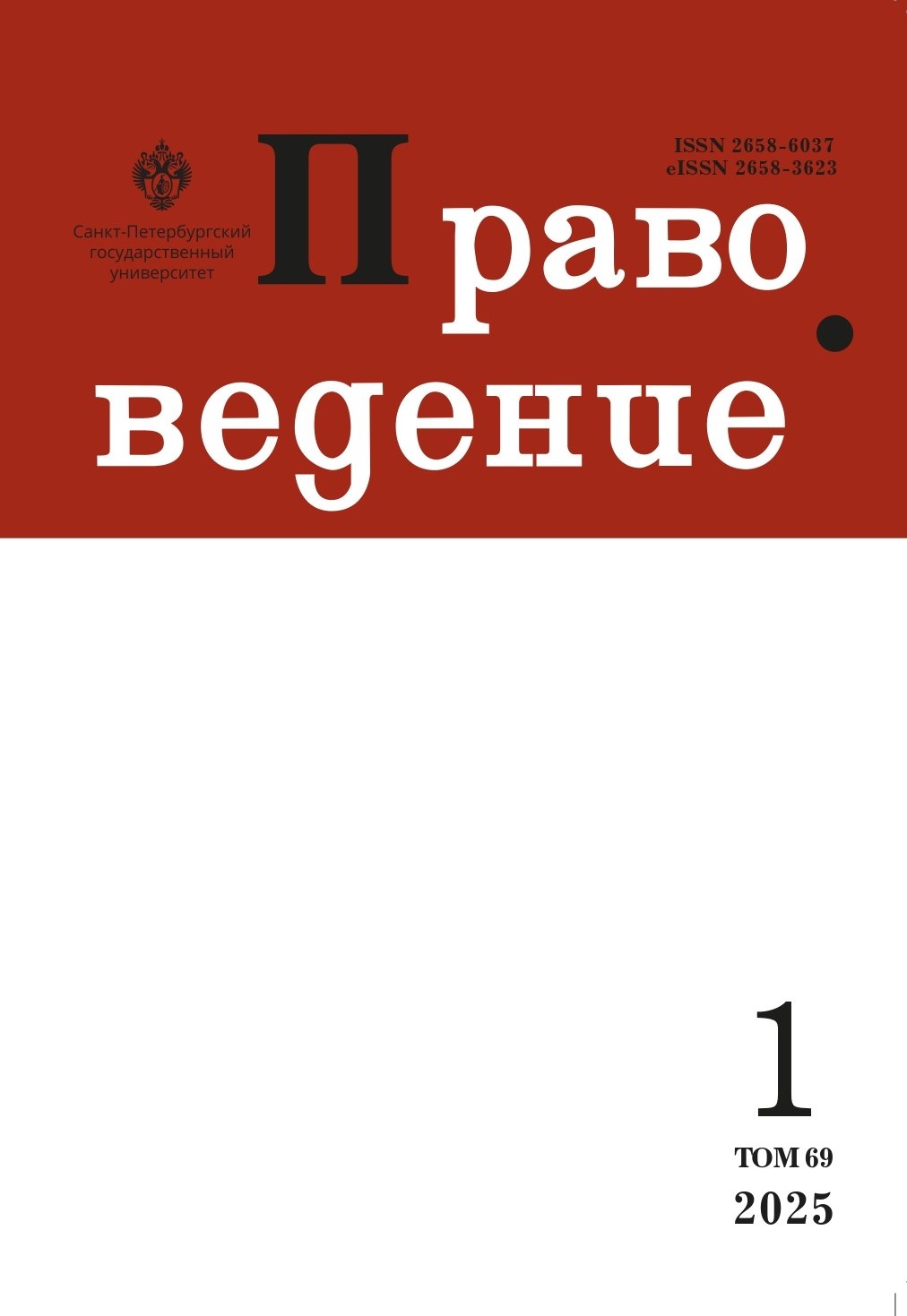Use of methods of intellectual text processing and large language models for analysis of information about legal relations in normative legal acts
DOI:
https://doi.org/10.21638/spbu25.2025.109Abstract
The article investigates the application of methods of machine processing of natural language texts (NLP, “natural language processing”) for automated extraction and evaluation of information about legal relations from the texts of normative legal acts with the use of large language models (LLM, “large language models”). The research is based on the hypothesis that the use of NLP and LLM technologies for solving tasks of this kind requires a reliance on fundamental ideas in the field of theory and philosophy of law. As such, the theory of legal relation developed in the works of P. P. Serkov was chosen, which is based on the idea of legal relation as a logical structure that forms a stable space and connects subjects for the materialization of subjective needs and goals on the principles of correlation and comparability, due to the impact on subjects of the ideological content of the totality of legal norms and circumstances of the regulated situation on the conditions of mutual reciprocity and parity of subjective rights and obligations. On the basis of experiments the effectiveness of the proposed methods and the significance of interrelation with the fundamental concept of legal relations are demonstrated.
Keywords:
natural language processing, large language models, legal relation, normative legal act, legal informatics, automation of legal processes, machine-readable law
Downloads
References
Arkhipov, Vladislav V. Semantic limits of law in the conditions of medial turn: theoretical and legal interpretation. Dissertation for the degree of Doctor of Legal Sciences. St. Petersburg, 2019.
Ariai, Farid, Demartini, Gianluca. 2024. Natural Language Processing for the Legal Domain: A Survey of Tasks, Datasets, Models, and Challenges. arXiv preprint arXiv:2410.21306
Chen, Zhiyu Z., Ma, Jing, Xinlu Zhang, Hao, Nan, Yan An, Nourbakhsh, Armineh, Yang, Xianjun, McAuley, Julian, Petzold, Linda, Wang, William Y. 2024. A Survey on Large Language Models for Critical Societal Domains: Finance, Healthcare, and Law. arXiv preprint arXiv:2405.01769
de Faria, Joana R., Xie, Huiyuan, Steffek, Felix. 2024. Automatic Information Extraction from Employment Tribunal Judgements Using Large Language Models. arXiv preprint arXiv:2403.12936
Drápal, Jakub, Westermann, Hannes, Savelka, Jaromir. 2023. Using Large Language Models to Support Thematic Analysis in Empirical Legal Studies. Frontiers of Artificial Intelligence and Applications. Vol. 379. Legal Knowledge and Information Systems: JURIX 2023. The Thirty-Sixth Annual Conference, Maastricht, the Netherlands, 18–20 December 2023. Amsterdam, IOS Press: 197–206. https://doi.org/10.3233/FAIA230965
Gracheva, Anastasiya V. 2019. From Legal Informatics to Legal Tech: Development History in Russia and Abroad. Zakon 5: 56–65. (In Russian)
Hohfeld, Wesley N. 1913. Some Fundamental Legal Conceptions as Applied in Judicial Reasoning. The Yale Law Journal 23 (1): 16–59. https://doi.org/10.2307/785533
Kropachev, Nikolay M., Arkhipov, Vladislav V. 2023. Values in the Moral Dimension of Law: Polemics with A. V. Polyakov in the Works of P. P. Serkov — The Perspective of the St. Petersburg School. Vestnik of Saitn Petersburg University. Law 4: 854–871. https://doi.org/10.21638/spbu14.2023.402 (In Russian)
Lai, Jinqi, Gan, Wensheng, Wu, Jiaying, Qi, Zhang liang, Yu, Philip S. 2024. Large Language Models in Law: A Survey. AI Open 5: 181–196.
Nay, John J., Karamardian, David, Lawsky, Sarah B., Tao, Wenting, Bhat, Meghana, Jain, Raghav, Lee, Aaron T., Choi, Jonathan H., Kasai, Jungo. 2024. Large Language Models as Tax Attorneys: A Case Study in Legal Capabilities Emergence. Philosophical Transactions of the Royal Society A 382 (2270): 20230159
Pham, Trang Ngoc Anh, Do, Dinh-Truong, Le Nguyen, Minh. 2024. A Framework for Enhancing Statute Law Retrieval Using Large Language Models. JSAI International Symposium on Artificial Intelligence. Vol. 14741. Singapore, Springer Nature Singapore: 247–259.
Poliakov, Andrei V. 2021. The Principle of Mutual Legal Recognition: Russian Philosophical-Legal Tradition and Communicative Approach to Law. Trudy Instituta Gosudarstva i Prava RAN 6 (16): 39–101. (In Russian)
Serkov, Petr P. 2018. Pravootnoshenie (Theory and Practice of Modern Legal Regulation): A Monograph in Three Parts. Moscow: Norma Publ. (In Russian)
Sichelman, Ted, Smith, Henry E. 2024. A Network Model of Legal Relations. Philosophical Transactions of the Royal Society A 382 (2270): 20230153
Susskind, Richard E. 1986. Expert Systems in Law: A Jurisprudential Approach to Artificial Intelligence and Legal Reasoning. The Modern Law Review 49: 168–194.
Trofimov, Egor V., Metsker, Oleg G. 2020. The Use of Computer Methods and Systems in the Study of Law, Intellectual Analysis, and Modeling of Legal Activities: A Systematic Review. Trudy Instituta sistemnogo programmirovaniya RAN 32 (3): 147–170. (In Russian)
Yue, Shengbin, Chen, Wei, Wang, Siyuan, Li, Bingxuan, Shen, Chenchen, Liu, Shujun, Zhou, Yuxuan, Xiao, Yao, Yun, Song, Huang, Xuanjing, Wei, Zhongyu. 2023. Disc-Law LLM: Fine-Tuning Large Language Models for Intelligent Legal Services. arXiv preprint arXiv:2309.11325
Zhou Y., Huang H., Wu Z. 2023. Boosting Legal Case Retrieval by Query Content Selection with Large Language Models. Proceedings of the Annual International ACM SIGIR Conference on Research and Development in Information Retrieval in the Asia Pacific Region. Association for Computing Machinery: 176–184.
Downloads
Published
How to Cite
Issue
Section
License
Articles of "Pravovedenie" are open access distributed under the terms of the License Agreement with Saint Petersburg State University, which permits to the authors unrestricted distribution and self-archiving free of charge.




